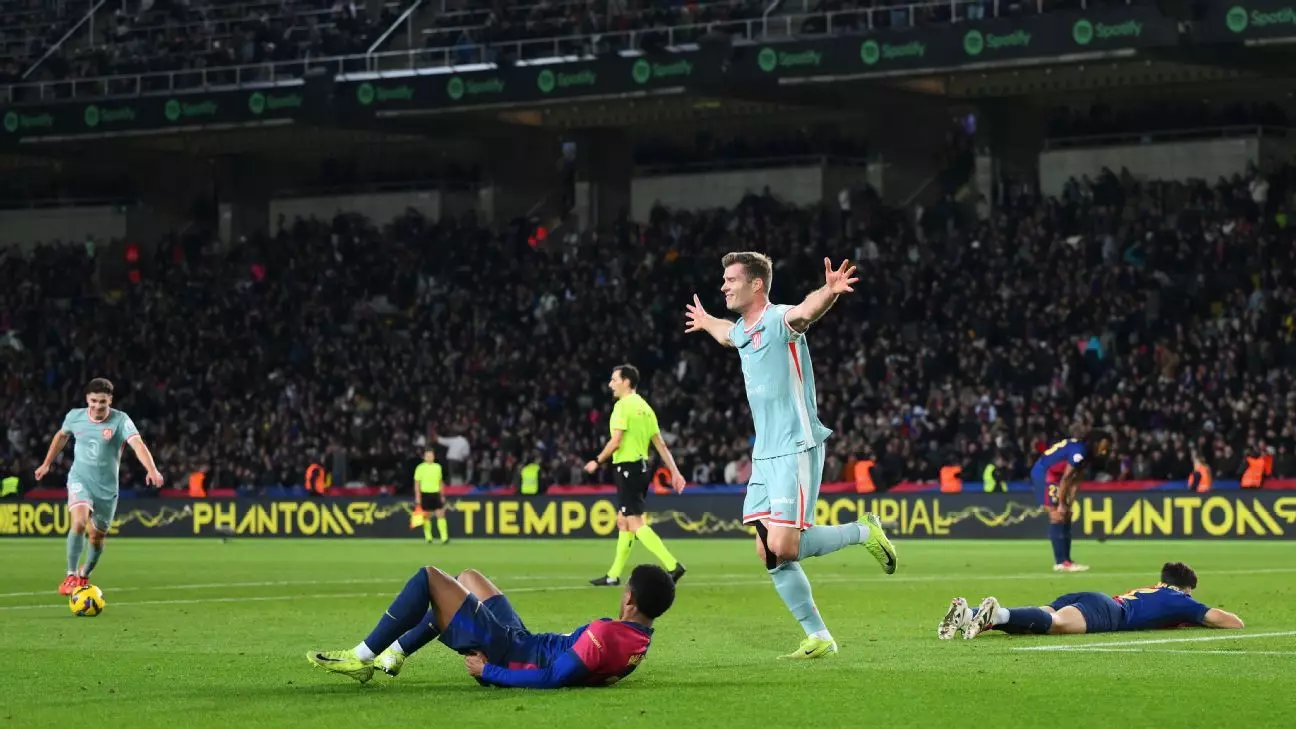The landscape of LaLiga has shifted dramatically in recent weeks, most notably after Atlético Madrid’s enthralling victory over FC Barcelona. Beginning November languishing ten points behind their arch-rivals, Atlético has effectively turned the tables, concluding the year three points ahead. Such an outcome highlights not only Atlético’s resurgence but also delves deeper into the struggles afflicting Barcelona. As we approach the mid-season break, an analysis of this pivotal match and the broader implications for both teams reveals a gripping tale of pressure, performance, and potential.
A Tale of Two Teams: Rising Titans and Fading Giants
In a match held at Barcelona’s Olympic Stadium, the contest bore the hallmarks of a classic rivalry yet unfolded as a microcosm of the contrasting trajectories of the two clubs. Barcelona started promisingly with Pedri scoring early in the match, showcasing their attacking flair. However, this initial surge did not translate into sustained dominance. Rodrigo De Paul’s late equalizer and Alexander Sørloth’s last-gasp winner not only sealed the victory for Atlético but symbolized Barcelona’s troubling reversion into form uncharacteristic of a club of their stature.
While Barcelona showcased moments of brilliance, including an impressive 19 shots and a noteworthy expected goals (xG) of 3.04, their failure to convert chances into tangible results raised pressing concerns. Their tactical approach, particularly an aggressive high defensive line, left them vulnerable. The defining moment came from Atlético’s counterattack, exploiting this weakness to remarkable effect, which speaks to a critical vulnerability within Barcelona’s system—something that Hansi Flick and his troops need to rectify urgently if they hope to recapture former glories.
Speculation has swirled regarding the reasons for Barcelona’s apparent decline. The narrative of fatigue has emerged, highlighted by the heavy minutes logged by core players—ten having exceeded 1,500 minutes this season. Raphinha’s acknowledgment of tiredness as a contributing factor reflects the broader sense of exhaustion that seems to accompany the squad during matches. However, during the Atlético showdown, Barcelona actually exhibited significant energy and competitiveness for vast stretches, which contradicts this notion.
A more compelling interpretation is the psychological toll that the inability to secure consistent victories may have inflicted. Barcelona began the season phenomenally but has since faltered with only six points from their last 21, a stark contrast that likely weighs heavily on the players’ confidence. The pressure to return to winning ways may manifest in hesitance, evidenced by several missed chances throughout the match. With tactical negligence compounded by psychological fatigue, Barcelona’s path forward remains fraught with uncertainty.
Atlético’s Strategic Mastery: A Lesson in Resilience
Conversely, Atlético Madrid demonstrated that they possess not only the tactical acumen to capitalize on their opponent’s mistakes but also the mental resilience to navigate the pressures of high-stakes matches. Their streak of twelve consecutive wins across competitions highlights a formidable and cohesive unit under Diego Simeone’s leadership. Atlético played conservatively for large portions of the match, absorbing pressure and waiting for the opportune moment to exploit Barcelona’s lapses—a strategy that paid dividends at the death.
Moreover, Simeone’s shrewd use of personnel substitutions provided fresh energy, steering the tide in Atlético’s favor. Their late goals, especially Sørloth’s dramatic winner, reflect a confidence that they can strike decisively when it matters. The triumph even marked Atlético’s first league victory in Barcelona since 2006, further amplifying its significance within the context of their history. This match underscores a burgeoning belief within the squad that they can not only contend but potentially dominate across the league.
As the teams head into the winter break, the shifting dynamics at the helm of LaLiga present a fascinating narrative. Atlético Madrid appears well-equipped to challenge for the title, with momentum on their side and a burgeoning sense of purpose. Meanwhile, Barcelona is at a crossroads, needing to redefine their approach and regain confidence to avoid further slips down the table.
Hansi Flick must recalibrate tactics, perhaps adjusting Barcelona’s defensive makeup while instilling a mindset that encourages seizing opportunities rather than succumbing to fear when matches hang in the balance. Conversely, Atlético must navigate the expectations that come with their newfound status as title contenders, all while capitalizing on a squad brimming with confidence.
As we transition into the second half of the season, the stage is set for an exhilarating title race, rich with narratives and brimming with potential. Each match will be a testament to resilience, strategy, and determination, keeping fans on the edge of their seats as LaLiga unfolds its complex storylines.

